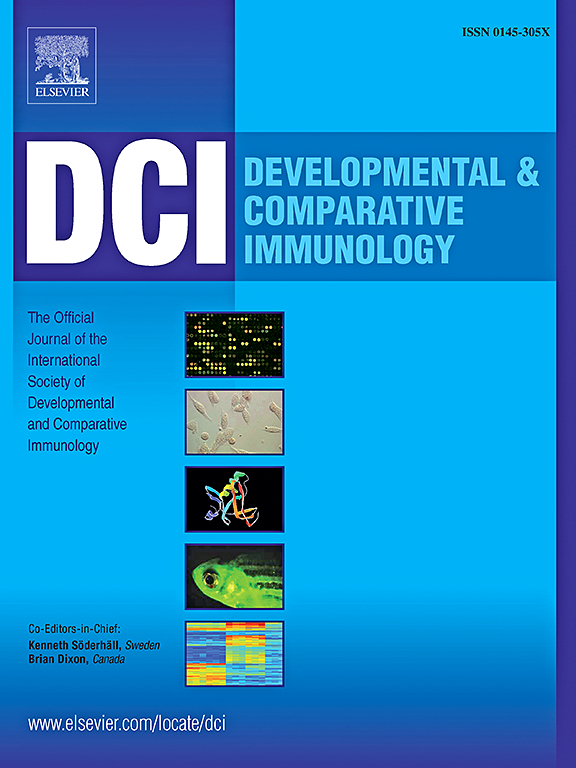Cellular immune senescence in mosquitoes accelerates when the temperature is warmer
IF 2.7
3区 农林科学
Q1 FISHERIES
引用次数: 0
Abstract
Mosquitoes are poikilotherms and ectotherms, so their body temperature is predicated by the temperature of their environment. As the temperature rises, development and metabolism quicken. At the same time, immune strength weakens with aging, a process called senescence. Aging can be characterized as a function of time (chronological age) or as a function of how well the body operates (physiological age), and we predict that warmer temperature decouples chronological and physiological aging, accelerating immune senescence. We evaluated how warmer temperature and aging interact to alter cellular immunity in the mosquito, Anopheles gambiae, by rearing them at three temperatures and quantifying the number of immune cells, called hemocytes, and their phagocytic activity at four ages. We discovered that the number of circulating hemocytes decreases with warmer temperature and aging, and that the aging-dependent decrease occurs faster when the temperature is warmer. However, the number of sessile hemocytes attached to the dorsal abdominal wall increases with infection and warmer temperature but decreases with aging. When a mosquito is infected, the aging-dependent decrease in the number of sessile hemocytes occurs faster when the temperature is warmer. Although the number of hemocytes decreases with aging, the phagocytic activity of individual hemocytes increases, with the aging-dependent increase occurring earlier when the temperature is warmer. Overall, warmer temperature accelerates senescence of the cellular immune response in mosquitoes, which has implications for how poikilotherms and ectotherms fight infections as they age in our warming world.
温度升高时,蚊子的细胞免疫衰老会加速
蚊子是变温动物和变温动物,所以它们的体温是由它们所处环境的温度决定的。随着温度的升高,发育和新陈代谢加快。同时,免疫能力随着年龄的增长而减弱,这一过程被称为衰老。衰老可以被描述为时间的函数(实足年龄)或身体运作的函数(生理年龄),我们预测温度升高会使实足年龄和生理衰老脱钩,加速免疫衰老。我们通过将冈比亚按蚊(Anopheles gambiae)饲养在三种温度下,并量化免疫细胞(称为血细胞)的数量及其在四种温度下的吞噬活性,来评估温度升高和衰老如何相互作用以改变冈比亚按蚊(Anopheles gambiae)的细胞免疫。我们发现,循环血细胞的数量随着温度的升高和衰老而减少,并且随着温度的升高,衰老依赖性的减少发生得更快。然而,附着在背腹壁上的无底血细胞数量随着感染和温度升高而增加,但随着年龄的增长而减少。当蚊子被感染时,随着年龄的增长,无梗血细胞数量的减少在温度升高时发生得更快。虽然血细胞数量随着年龄的增长而减少,但单个血细胞的吞噬活性增加,并且随着温度的升高,衰老依赖性的增加发生得越早。总的来说,温暖的温度加速了蚊子细胞免疫反应的衰老,这对变暖的世界中变老的变温动物和变温动物如何对抗感染有影响。
本文章由计算机程序翻译,如有差异,请以英文原文为准。
求助全文
约1分钟内获得全文
求助全文
来源期刊
CiteScore
6.20
自引率
6.90%
发文量
206
审稿时长
49 days
期刊介绍:
Developmental and Comparative Immunology (DCI) is an international journal that publishes articles describing original research in all areas of immunology, including comparative aspects of immunity and the evolution and development of the immune system. Manuscripts describing studies of immune systems in both vertebrates and invertebrates are welcome. All levels of immunological investigations are appropriate: organismal, cellular, biochemical and molecular genetics, extending to such fields as aging of the immune system, interaction between the immune and neuroendocrine system and intestinal immunity.

 求助内容:
求助内容: 应助结果提醒方式:
应助结果提醒方式:


